From ‘Healing Wounds,
Mending Scars’ to ‘From Survivors to Healers’
by Josephine Z. Callejo and Fr. Juvenal A. Moraleda
It was the Asian Federation Against Involuntary Disappearances (AFAD)
that first introduced in the Asian region a more organized, structured
and sustained psycho-social program for the families of victims of
enforced disappearances to its memberorganizations. Before then, there
had only been a very limited and case-to-case response to this urgent
need, and only in some member-organizations of AFAD, e.g. in the
Philippines and Indonesia. It was in 2004 that the AFAD decided to do
something about the situation.
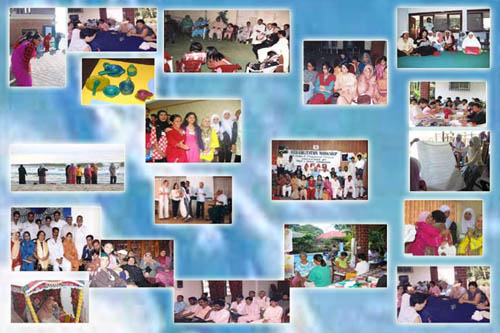
“Healing Wounds, Mending Scars”
This was both the theme and the title of the workshop that launched the
AFAD psycho-social rehabilitation program in the region in 2004. This
workshop was held in Jakarta, Indonesia from 6-10 December 2004. The
participants were selected family members of disappeared victims from
AFAD member- organizations from Thailand, Philippines, Sri Lanka,
Pakistan, (Kashmir) India, and host country, Indonesia and with
participation from representatives of organizations of families of the
disappeared from Latin America and Africa and two representatives from
Linking Solidarity. At that time, AFAD did not yet have a
member-organization in Nepal. All in all, there were 40 participants in
this pilot-workshop, not to mention the participation of the staff
members from host organizations, IKOHI and KontraS.
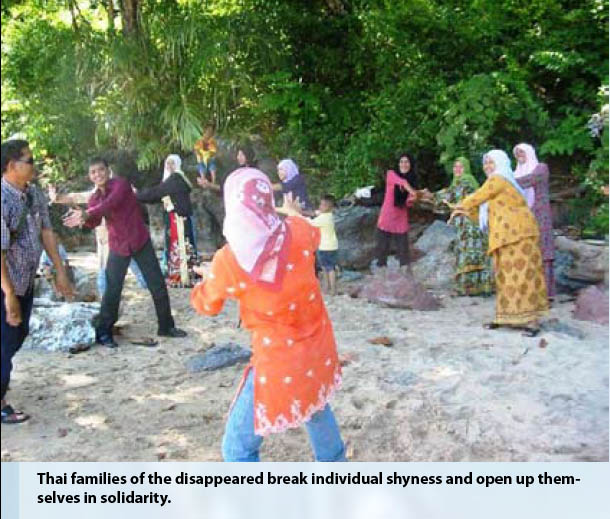 Two
facilitators from the Philippines had been commissioned by the AFAD
Council to design and implement the program: Ms. Josephine Callejo, a
counseling psychologist, and Fr. Juvenal Moraleda, a family and marital
counselor. They also facilitated this pilot-workshop in Indonesia.
Combining our varied but complementary expertise in our individual
fields, we came up with a psycho-social rehabilitation program based on
Dr. Judith Lewis Herman M.D.’s framework on Stages of Trauma
Recovery. We utilized group dynamics theories and practices that
take serious consideration the various and varied cultural and religious
beliefs, traditions and practices of the multi-nationalist participants.
To off-set the foreseen problem of the participants’ different
languages, we made use of artistic and creative expressions like
drawing/painting, clay sculpture, rituals, role-playing, power-point
presentations, etc. But we also were ready with instant translators
during the small group sharing and the plenary sessions.
Two
facilitators from the Philippines had been commissioned by the AFAD
Council to design and implement the program: Ms. Josephine Callejo, a
counseling psychologist, and Fr. Juvenal Moraleda, a family and marital
counselor. They also facilitated this pilot-workshop in Indonesia.
Combining our varied but complementary expertise in our individual
fields, we came up with a psycho-social rehabilitation program based on
Dr. Judith Lewis Herman M.D.’s framework on Stages of Trauma
Recovery. We utilized group dynamics theories and practices that
take serious consideration the various and varied cultural and religious
beliefs, traditions and practices of the multi-nationalist participants.
To off-set the foreseen problem of the participants’ different
languages, we made use of artistic and creative expressions like
drawing/painting, clay sculpture, rituals, role-playing, power-point
presentations, etc. But we also were ready with instant translators
during the small group sharing and the plenary sessions.
A few words on the workshop itself – its rationale and methodology:
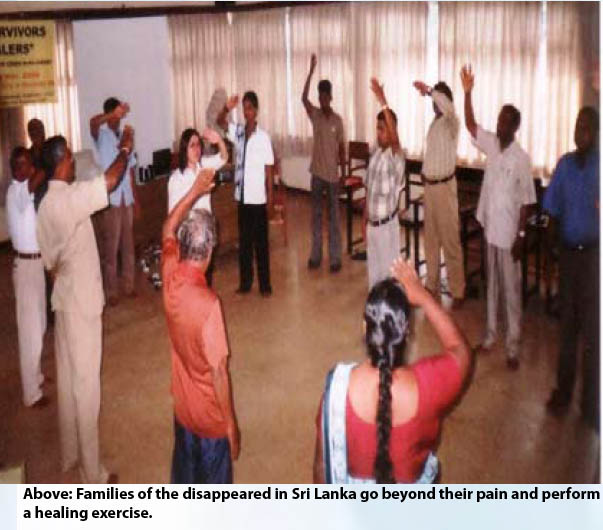 Our
basic premise was that all the participants had been deeply traumatized
by the sudden and oftentimes violent disappearance of their loved ones;
and that they were still suffering from the traumatic event. But for
most of them, the traumatic event had happened many years before, even
decades ago for some. And most if not all of them had either ‘forgotten’
the event, or had denied or trivialized its effects on them, whereas for
some they wanted to believe they have been ‘healed’ of their
trauma. And the most common reason for these varied reactions is because
these victim-families were still living in the same oppressive
political, economic, social conditions which caused the disappearances
of their loved ones. So, consciously or unconsciously, they were neither
willing nor able to get the ‘space and opportunity’ to look back to what
had happened, to be in touch with the physical, mental, emotional and
spiritual effects of what happened, to process and find new meanings to
their traumatic experiences, to (re)discover both the inner and external
resources they have to deal with what happened, and finally, to move on
with their life from the tragedy they have experienced. Most of them
remained a “victim” or took on a “victim mentality.”
Our
basic premise was that all the participants had been deeply traumatized
by the sudden and oftentimes violent disappearance of their loved ones;
and that they were still suffering from the traumatic event. But for
most of them, the traumatic event had happened many years before, even
decades ago for some. And most if not all of them had either ‘forgotten’
the event, or had denied or trivialized its effects on them, whereas for
some they wanted to believe they have been ‘healed’ of their
trauma. And the most common reason for these varied reactions is because
these victim-families were still living in the same oppressive
political, economic, social conditions which caused the disappearances
of their loved ones. So, consciously or unconsciously, they were neither
willing nor able to get the ‘space and opportunity’ to look back to what
had happened, to be in touch with the physical, mental, emotional and
spiritual effects of what happened, to process and find new meanings to
their traumatic experiences, to (re)discover both the inner and external
resources they have to deal with what happened, and finally, to move on
with their life from the tragedy they have experienced. Most of them
remained a “victim” or took on a “victim mentality.”
It is this ‘space and opportunity’ that the participants have been
denied or have denied themselves that the psycho-social workshop aimed
to offer them. We deemed it appropriate to use Dr. Judith Herman’s,
Three Stages of Trauma Recovery: 1) Establishment of Safety; 2)
Remembering and Mourning; 3)Reconnection with Reality.
1.)
Establishment of Safety
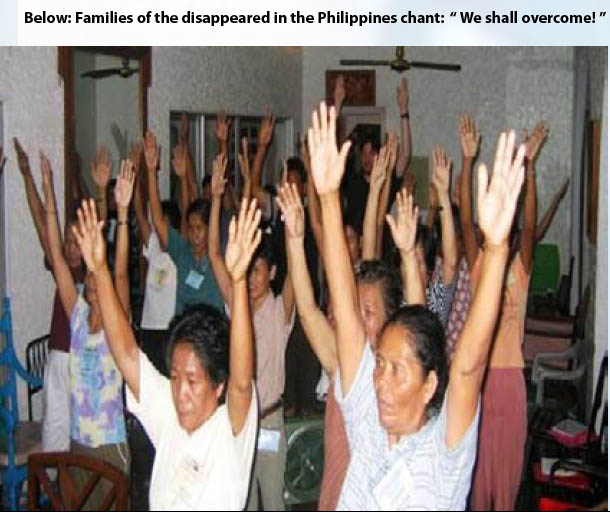 Loss
of trust, that is, a deep sense of not being safe, from anyone,
including oneself, is surely one of the gravest wounds inflicted on the
family of the disappeared. Therefore, the process of ‘recovery’ must
start there, in helping the ‘victim’ to regain trust and to start
believing again that one is protected and is safe. In the workshop, we
promoted this, first of all, by taking the participants away from the
places/situations where they had experienced danger and threat. Through
appropriate activities like breathing and relaxation exercises, teaching
them basic body movements, utilizing Oriental concepts that foster
harmony of body and mind (e.g. Shibashi, meditation, body prayer), we
led the participants to become aware of and to trust again their
physical, mental and spiritual capabilities that were momentarily
‘paralyzed’ by the tragedy they had experienced; as well as the need to
continually nourish and strengthen these capabilities as resources for
their ‘safety’. Through group dynamics activity like “getting to know
each other,” “trust walk,’ ‘trust fall,’ nights of cultural exchange,
socialization, parlor games, we aimed to gradually make the participants
regain the need and possibility of trusting some other than oneself. It
was a joy to notice the participants who had come in fearful and
untrusting of themselves and others slowly opening up and joining the
group in the activities.
Loss
of trust, that is, a deep sense of not being safe, from anyone,
including oneself, is surely one of the gravest wounds inflicted on the
family of the disappeared. Therefore, the process of ‘recovery’ must
start there, in helping the ‘victim’ to regain trust and to start
believing again that one is protected and is safe. In the workshop, we
promoted this, first of all, by taking the participants away from the
places/situations where they had experienced danger and threat. Through
appropriate activities like breathing and relaxation exercises, teaching
them basic body movements, utilizing Oriental concepts that foster
harmony of body and mind (e.g. Shibashi, meditation, body prayer), we
led the participants to become aware of and to trust again their
physical, mental and spiritual capabilities that were momentarily
‘paralyzed’ by the tragedy they had experienced; as well as the need to
continually nourish and strengthen these capabilities as resources for
their ‘safety’. Through group dynamics activity like “getting to know
each other,” “trust walk,’ ‘trust fall,’ nights of cultural exchange,
socialization, parlor games, we aimed to gradually make the participants
regain the need and possibility of trusting some other than oneself. It
was a joy to notice the participants who had come in fearful and
untrusting of themselves and others slowly opening up and joining the
group in the activities.
2.)
Remembering and Mourning
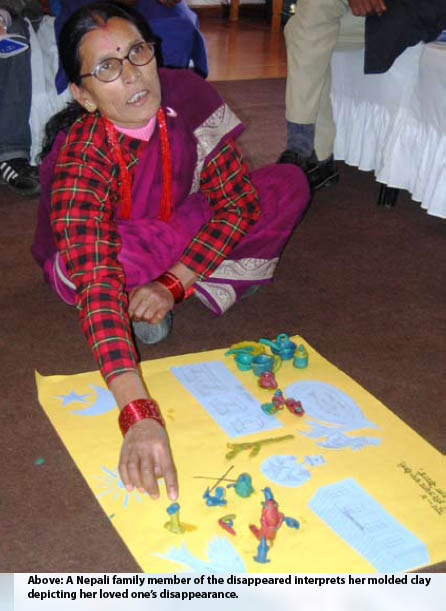 This
was the most poignant and liberating portion of the whole workshop.
This
was the most poignant and liberating portion of the whole workshop.
The lyrics of the song “Tears were flowing like a river’ was played out
at this stage. But it did not happen like magic.
It was almost hard to believe that after all these years, this was the
very first time since they lost their loved ones that most of the
participants had the chance to really look back and truly grieve for all
that was lost. They had valid enough reasons for this: too busy with
’more urgent’ matters, they had to be strong for the ‘weaker’ members of
the family, grieving would have only made them give up, etc. But
ultimately, it boiled down to one sad truth: they had felt there was no
one who would really listen and understand their ‘story’ and ‘accompany’
them in their grief! And so, their story had remained untold, and their
tears had dried up unshared inside themselves! And they were none too
enthusiastic at first to dig up what had been dormant for so long and
share it with near-total strangers!
But evidently among them, trust had slowly started to come back, and
they had started gradually to feel safe with and among each other. This
process was helped immensely by activities that allowed them to
remember, to tell their stories and grieve their ‘losses’ not so much
with words as with the use of art drawing, painting, clay sculpture,
song-making, poem writing, sharing pictures of their loved ones - as
well as role playing, singing, and small group sharing. Where there was
a need to use words, we employed direct translations to facilitate
understanding between the varied languages of the participants. They
were allowed a space to express their sorrow in tears and sighs and
anger in the presence of warm and accepting companions.
3.)
Reconnection with Reality
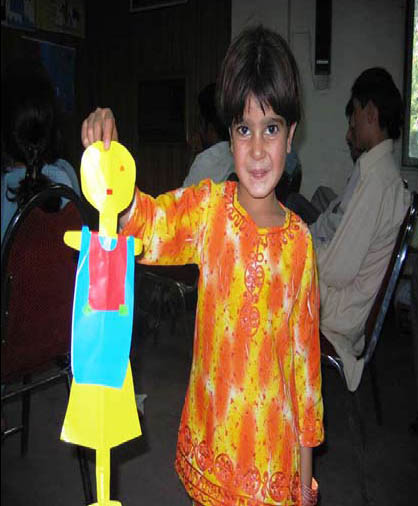 We
also call this stage ‘reframing the experience’, in the way that a
picture takes on a different perspective when put into a different
frame.
We
also call this stage ‘reframing the experience’, in the way that a
picture takes on a different perspective when put into a different
frame.
Having found the trust one needed to feel safe again, the participants
were able to tell their total story, to recognize and own all the
emotions and effects caused by the tragic event, and to feel understood,
accepted, supported and empowered to move on.
But not in a vacuum, in fantasy or selfdelusion, but rooted in reality –
their reality and the reality that surrounds them… It was here that the
participants were challenged to identify and claim the resources they
have at their command. If they had indeed lost their loved ones (even
temporarily), what have they not lost or still possessed in spite of
what had happened.
Again, through sharing with one another, in words but also in activities
that expressed their hopes and their dreams (e.g. kite/lantern-making,
prayer/song/poem composition, role playing, etc), inner and external
resources slowly began to surface, to be claimed and celebrated in
cultural and religious rituals. Interesting to note, that although the
participants were of varied nationalities, the common Asian values and
heritage characterized the most basic strength and resources that the
participants identified as their own: strong family ties, true neighbor/
friend comradeship, and above all, a deepseated trust in a higher Being,
whether one called Him/Her God, Allah, Buddha, Jesus, or no name.
The 2004 pilot workshop “Healing Wounds, Mending Scars’ in Indonesia was
deemed a success by AFAD and the participants. And there was a united
clamor to echo the workshop back to their own countries. So, during the
following months, we held the Healing Wounds, Mending Scars workshops in
Thailand, Sri Lanka, Indonesia, Kashmir-India, Pakistan and Philippines,
Indonesia, and Nepal (which had an AFAD member-organization in December
2006). The two of us, Ms. Callejo and Fr. Moraleda, facilitated most of
these echo-workshops, except for one workshop in Southern Thailand, and
another in Pakistan which were facilitated by two other facilitators
from the Philippines, and one each in Indonesia and Kashmir-India which
made their own arrangement with their own facilitators.
From Survivors to Healers
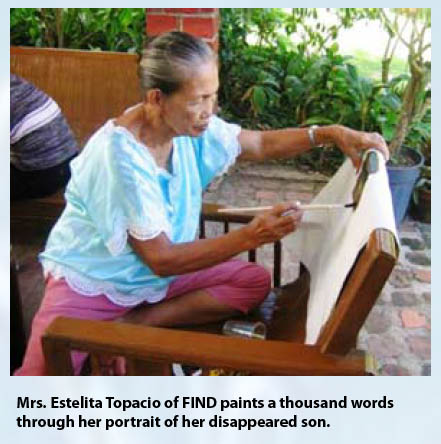 During
the ‘Healing Wounds, Mending Scars’ Workshops, we had three very
important realizations, among other things: one, that there were
countless other families of victims in the member-organizations of AFAD
who needed this kind of psycho-social trauma rehabilitation assistance;
two, that AFAD Regional office could not cater to all of these families
from the ‘center’; and three, that AFAD should/could perhaps help the
member-organizations to train local and develop local facilitators to do
their own psycho-social rehabilitation program.
During
the ‘Healing Wounds, Mending Scars’ Workshops, we had three very
important realizations, among other things: one, that there were
countless other families of victims in the member-organizations of AFAD
who needed this kind of psycho-social trauma rehabilitation assistance;
two, that AFAD Regional office could not cater to all of these families
from the ‘center’; and three, that AFAD should/could perhaps help the
member-organizations to train local and develop local facilitators to do
their own psycho-social rehabilitation program.
Thus, was born the trainors’ training program which we rather
ambitiously called “From Survivors to Healers” Workshop. Its
objective was precisely to help train local psycho-social facilitators
to minister to victims’ families in their own locality. And we had a
very successful launching of the “From Survivor to Healers” Workshop in
Colombo, Sri Lanka, from 27-29 November 2006. This first trainors’
training workshop was participated in primarily by selected Sri
Lankan family members of victims who had already attended the “Healing
Wounds, Mending Scars” echoworkshop which was held earlier in Sri Lanka.
Two local psychologists and a psychiatrist were also invited to
participate and help us to facilitate the workshop. It proved quite
successful, from all reports.
 The
long-term plan was to conduct the “From Survivor to Healers”
workshop in all the other AFAD member-countries and jump-start their own
program.
The
long-term plan was to conduct the “From Survivor to Healers”
workshop in all the other AFAD member-countries and jump-start their own
program.
Unfortunately, due to shortage of funds, this plan had to be shelved for
the meantime. AFAD is still in the process of looking for possible
funders to sponsor this worthwhile project. Meanwhile hundreds of
families of the involuntary disappeared are waiting to tell their story,
to share their grief, to recognize and claim their inner and external
resources, and finally, to move on from being Victims and Survivors
to becoming Wounded Healers.
We hope and pray they do not wait
forever...

Josephine Z. Callejo has an M.A. in Counseling Psychology degree (or is
a Counseling Psychologist) and currently a Consultant of AFAD in their
PsychoSocial Trauma Recovery work for the member families of the AFAD in
Asia. She co- developed and co- facilitated these recovery programs
since 2004 in Indonesia, Sri Lanka, Thailand, Nepal and the Philippines.
Ben Moraleda, M.A. is a Marital and Family Counselor and a Faculty
Member at the Center for Family Ministries (CEFAM). He is also the
national spokesperson for Kaalagad Katipunang Kristyano (KKK), an
ecumenical group advocating genuine and lasting societal and ecclesial
transformation, and a member of the Executive Committee of the
Faithbased Congress against Immoral Debts (FCAID).